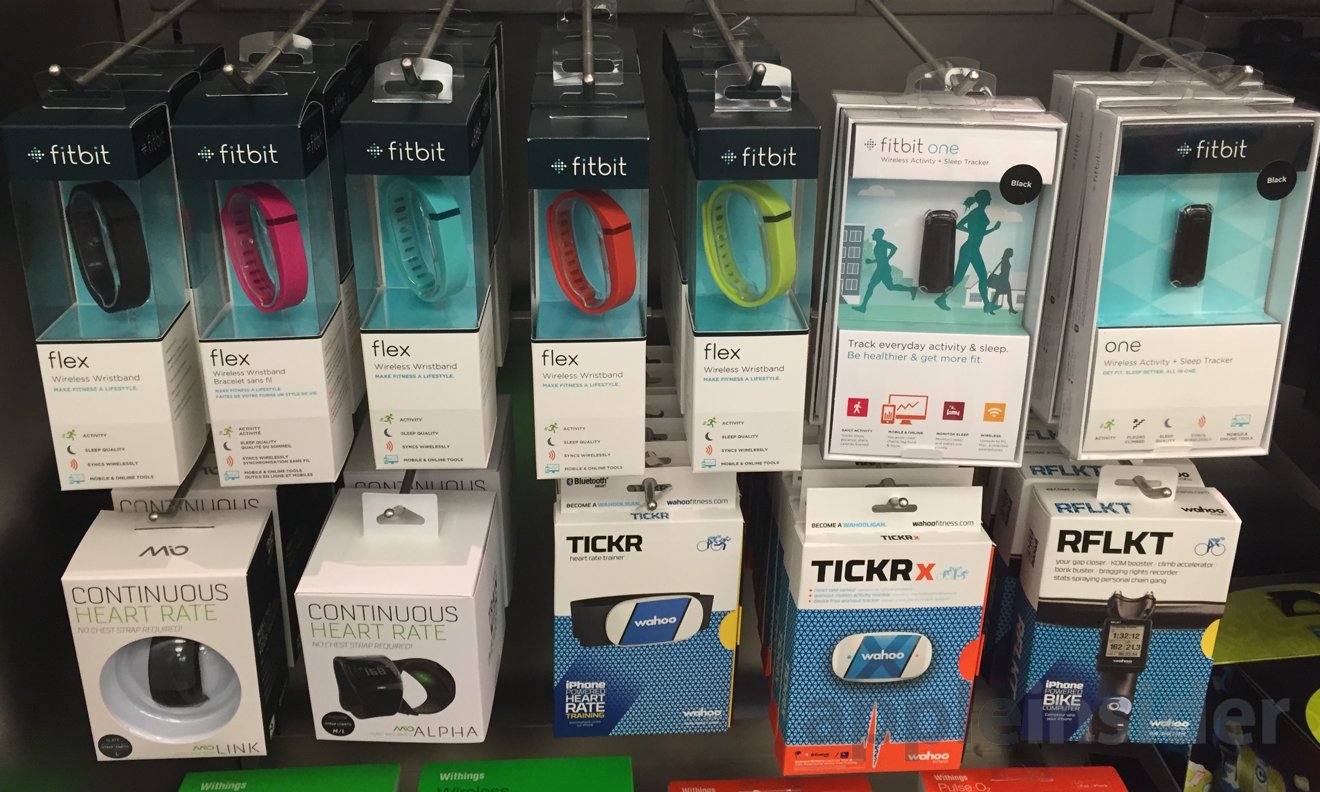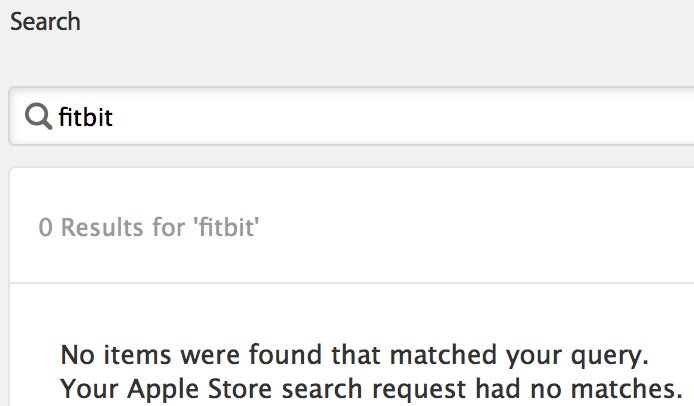Though Apple removed Fitbit hardware from its online store last week, the company's popular lineup of activity tracking devices remain on the shelves at Apple's retail stores.
The versatile Fitbit One and wrist-worn Fitbit Flex both remain available at Apple Stores across the country, AppleInsider has confirmed. They can be found alongside other fitness tracking devices like the Jawbone Up, Wahoo Tickr and Mio Alpha.
Fitbit's One and Flex were also available via Apple's online store until last Friday, when they were removed without explanation. Apple's apparent plans to stop selling Fitbit hardware entirely were leaked last month.
Apple Store employees asked about the availability of Fitbit products at retail had no clues as to Apple's future plans, including how long Fitbit devices might remain available on the shelves.
Fitbit recently unveiled a trio of new fitness trackers set to launch in the near future, some of them with heart rate tracking. But given the current situation, it's not expected that they will be sold by Apple.
Though the Fitbit devices to connect to Apple's iOS, they are not compatible with the company's HealthKit tools for developers, or the accompanying Health app in iOS 8. The company indicated in October that it does not have plans to integrate with HealthKit because it's not cross-platform, though it is "evaluating" the service and suggested it could change course if there is enough user demand.
One possible reason Fitbit's reluctance to embrace HealthKit is the fact that data exporting is a "premium" feature in the company's ecosystem. The ability to freely export Fitbit data, and integrate it with other services, requires a membership priced at $49.99, while Apple's HealthKit could accomplish that same task for free.
In addition to the HealthKit dispute, Apple will also be launching its own fitness tracking Watch in early 2015, and that device will accomplish many of the same functions as the Fitbit product family.
 Neil Hughes
Neil Hughes









 Charles Martin
Charles Martin

 Malcolm Owen
Malcolm Owen
 William Gallagher
William Gallagher

 Christine McKee
Christine McKee
 Wesley Hilliard
Wesley Hilliard









30 Comments
The items will remain on the shelf until the stock is sold. Simple answer.
Makes sense to pull the stuff, why sell items that don't integrate into the ecosystem Apple is continuing to build. It'd be like selling the Chromecast dongle in the Apple Store.
Monopoly behaviour or healthy curation of not-good-enough products? Fitbit was, even a year ago, touted as a highly valuable partner. I don't care for them (I don't use their stuff and am planning on getting the iWatch) but I'm a bit queasy about Apple's general behavior. They remind me of MS 15 years ago. Am I the only one to remember when Internet Explorer was monopolistically pushed because it was "in the interest for consumers"?
Makes sense to pull the stuff, why sell items that don't integrate into the ecosystem Apple is continuing to build. It'd be like selling the Chromecast dongle in the Apple Store.
Except the Chromecast doesn't have an app for iPhone and wasn't initially designed to work with the iPhone until Apple pushed a new, incompatible with their business model, software API.
The only thing that makes the situation problematic is Apple's own success, since pulling their competitor (which used to be a partner and now, through Apple's own decisions, has turned into a competitor), means that this competitor is bound to die. It's doubly damning due to the fact that not only is this true, but it also could be seen as a case of "stifling the competition for other platforms", as Fitbit mention they don't want to implement HK as HK is incompatible with Android (obviously).
As a world leader, you can't be expected to behave with the same rules as the underdogs, and that's Apple's issue here. They've been the underdog so long they don't see that this protective behaviour, enabled by their de facto monopoly, is comparable to Microsoft's in the 90s, and that's a threat to their reputation, which is their most valuable asset (and worth billions).
[quote name="lightknight" url="/t/183336/fitbit-products-remain-on-the-shelves-at-apple-stores-for-now#post_2637273"]Except the Chromecast doesn't have an app for iPhone and wasn't initially designed to work with the iPhone until Apple pushed a new, incompatible with their business model, software API. The only thing that makes the situation problematic is Apple's own success, since pulling their competitor (which used to be a partner and now, through Apple's own decisions, has turned into a competitor), means that this competitor is bound to die. It's doubly damning due to the fact that not only is this true, but it also could be seen as a case of "stifling the competition for other platforms", as Fitbit mention they don't want to implement HK as HK is incompatible with Android (obviously). As a world leader, you can't be expected to behave with the same rules as the underdogs, and that's Apple's issue here. They've been the underdog so long they don't see that this protective behaviour, enabled by their de facto monopoly, is comparable to Microsoft's in the 90s, and that's a threat to their reputation, which is their most valuable asset (and worth billions). [/quote] Apple has the right to sell whatever it wants in its stores. Obviously it's going to sell accessories that play well with iPhones and iPads. As far as not supporting HealthKit because it's not cross platform I think that's a load of BS. Nike doesn't seem to have a problem supporting it. Neither does Jawbone whose fitness bands will be compatible with HealthKit. Just curious...is Google Fit compatible with Windows Phone?